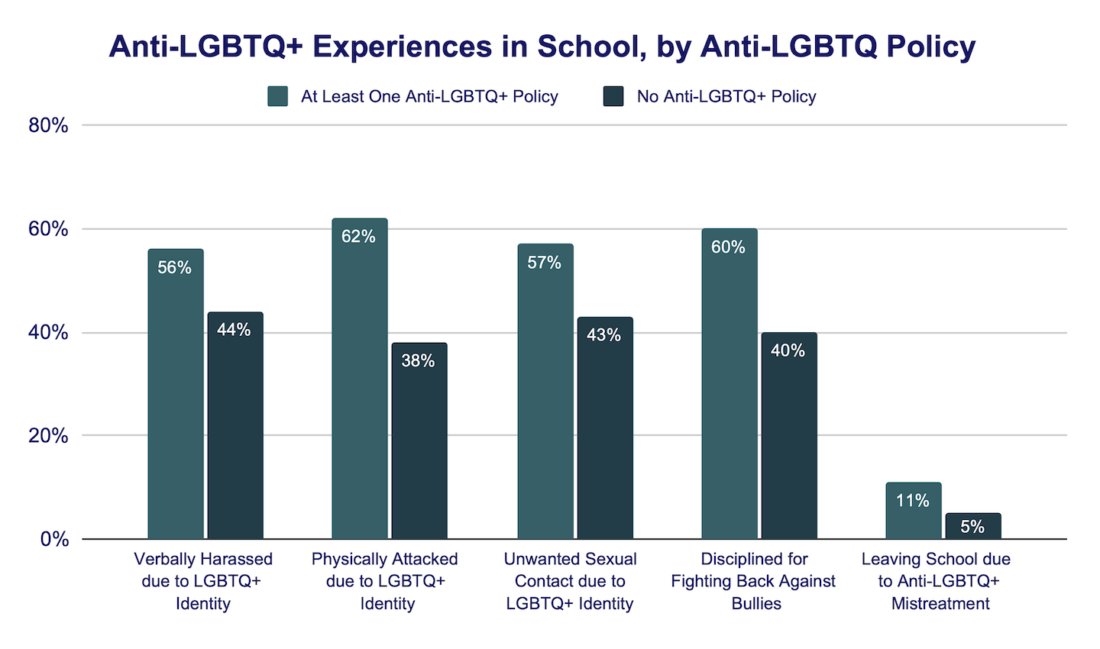Attending a school with just one anti-LGBTQ+ policy is associated with higher rates of anxiety (78%), depression (67%), and suicide attempts (55%) in the past year for LGBTQ+ students, according to a new report released on Wednesday from The Trevor Project.
The report considers anti-LGBTQ+ policies to be the following:
- censoring discussions of LGBTQ+ people or issues throughout all school curricula
- requiring schools to provide advance notice to parents when LGBTQ+ issues will be discussed and offering parents the opportunity to opt their children out of these lessons
- restricting how “homosexuality” is discussed in certain settings
- laws preventing schools from adding LGBTQ+-specific protections to anti-bullying policies
- blocking transgender and nonbinary students from playing on sports teams or using gendered facilities (e.g., locker rooms, bathrooms)
- requiring school staff to out transgender youth to their families if they use a different name or pronouns at school, without considering how that outing may endanger the student (LGBTQ+ young people who have been outed to their parents report higher rates of depression and lower levels of LGBTQ+-specific support from their families.).
The report also says that young people who are LGBTQ+ and live in states with a larger proportion of schools using LGBTQ+-inclusive sexual education curricula report lower suicide risk, as well as fewer experiences of bullying than their peers living in states with less LGBTQ+-inclusive sexual education. Additionally, LGBTQ+ students in schools with more supportive environments report lower suicide risk and fewer depressive symptoms than those living in more negative environments.
Do Anti-LGBTQ+ Policies Negatively Impact School Attendance?
More than two in five (44%) LGBTQ+ young people attending a school with at least one anti-LGBTQ+ policy only attend school sometimes, which is a higher rate than the 38% of LGBTQ+ students attending schools with no anti-LGBTQ+ policies.
Related Article: CDC: Over 40% of LGBTQ+ Teens Considered Suicide in Past Year
Additionally, higher rates of anti-LGBTQ+ experiences are associated with schools with at least one anti-LGBTQ+ policy, compared to those that have none:
- Verbal harassment: 56% vs. 44%
- Physical assault: 62% vs. 38%
- Unwanted sexual contact: 57% vs. 43%
- Being disciplined for fighting back against bullies: 60% vs. 40%
- Leaving school due to anti-LGBTQ+ mistreatment: 11% vs. 5%
The study also found that LGBTQ+ young people who attended schools with at least one anti-LGBTQ+ policy reported lower rates of LGBTQ+-related support at school. Thirteen percent said none of their teachers respected their pronouns, compared to 5% of their peers who attended schools with no anti-LGBTQ+ policies.
Click here to read the full report.
Other Related Articles:
- Human Rights Campaign: 30% of LGBTQ+ Students Diagnosed with Disability
- 5 Policies Proven to Reduce LGBTQ Student Suicide Risk and How Many Schools Actually Have Them
- How Diversity and Inclusion Can Promote a Better, Safer College Experience for All
If you or someone you know is struggling with mental health and may need support, contact the National Alliance on Mental Illness at 1-800-950-NAMI (6264) or the Substance Abuse and Mental Health Services Administration at 1-800-662-HELP (4357).







